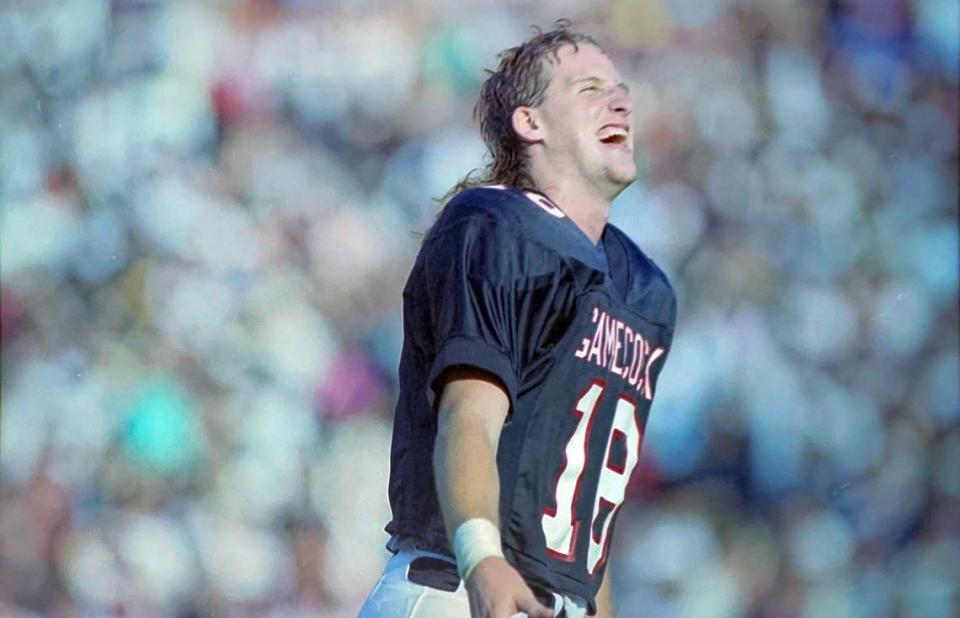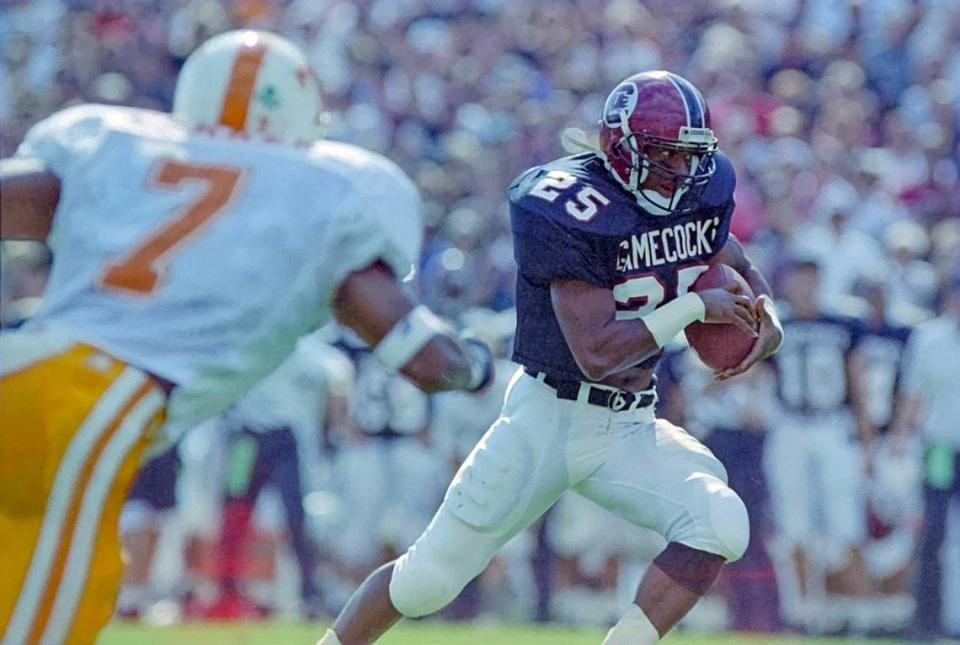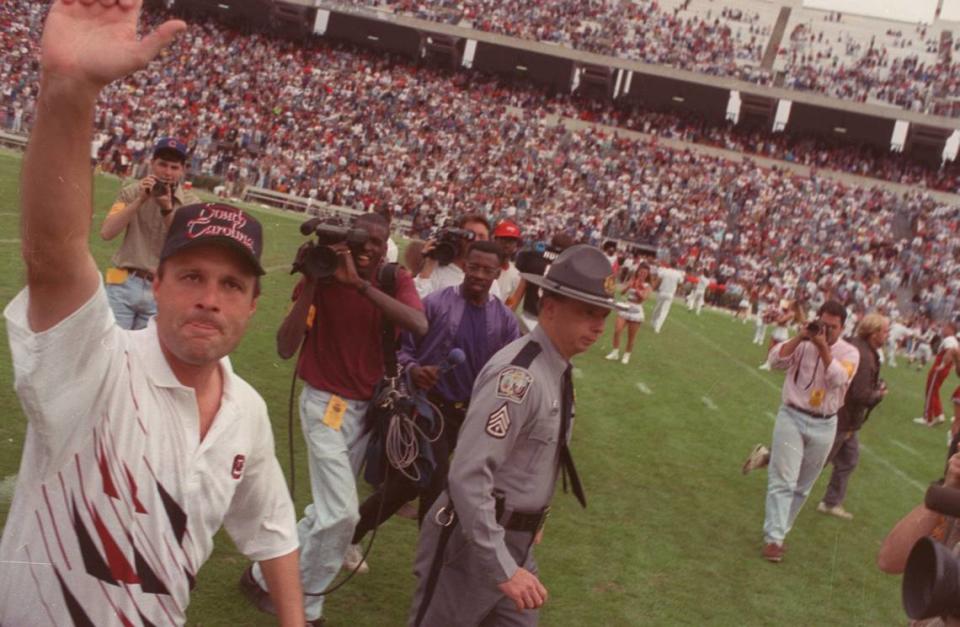‘Forever remembered’: How USC’s 1992 upset of Tennessee energized an unusual season
- Oops!Something went wrong.Please try again later.
For South Carolina football, 1992 was unusual.
It was the Gamecocks’ inaugural football season in the SEC. Five weeks and five losses in, the players voted 62-24 to ask for head coach Sparky Woods’ resignation.
Oh, and while all of this was happening, Touchstone Pictures had folks in and out of the Gamecocks’ facilities to film part of the soapy 1993 football flick, “The Program” (starring the unlikely trio of James Caan, Halle Berry and Omar Epps).
Not your average college football season.
“It’s a book by itself,” quarterback Steve Taneyhill said. “And there’s a lot of moving parts that go in that book.”
The Gamecocks’ story had a brutal beginning. But finally, on Oct. 31, came a much-needed plot twist.
This Saturday marks the last time for the immediate future South Carolina and Tennessee will play football against each other — a matchup that’s taken place every year since South Carolina joined the SEC. For some with ties to USC athletics, the upcoming game will be bittersweet.
But it’s also an occasion that allows them to revisit that 1992 battle between South Carolina and the Volunteers, when the Gamecocks upset No. 16 Tennessee 24-23 at home and helped turn their season around.
Conference blues
When the South Carolina head coaching job came around in 1989, Sparky Woods knew the timing was imperfect.
USC was on indefinite probation (to avoid the death penalty with another mess-up) from the NCAA for violations in men’s basketball and football. In October of 1988, Sports Illustrated ran a story detailing steroid use by football players and the coaching staff’s knowledge of it. And less than four months later head coach Joe Morrison died suddenly, hence the job opening.
But at 35 years old, coming from I-AA Appalachian State, Woods felt he couldn’t say no.
Before 1992, South Carolina logged 20 seasons as a football independent. Not great for recruiting or securing bowl invitations. One of Woods’ proudest achievements with the Gamecocks was helping them get off probation and into the SEC. (At the time he thought South Carolina should return to the ACC instead. But Florida State coach Bobby Bowden had different plans and a bigger say.)
“I felt at that time we had to get into a conference because probably only Notre Dame was capable of staying independent and surviving,” Woods said.
“I knew that when it happened it wasn’t going to be very good for the coach, but would be very good for the team, and the school. … I think that was a huge step in the maturation of athletics, and football certainly, at South Carolina.”
Ahead of the 1992 campaign, league media picked the Gamecocks to finish last in the conference winning nary a game along the way. Their predictions looked better with each passing Saturday.
▪ Sept. 5: 28-6 loss to Georgia.
▪ Sept. 12: 45-7 loss to Arkansas.
▪ Sept. 19: 20-18 loss to East Carolina.
▪ Sept. 26: 13-9 loss to Kentucky at Lexington.
▪ Oct. 3: 48-7 loss to Alabama at Tuscaloosa.
Things were bad. In fact, so bad that Paul Finebaum — then a columnist at the Birmingham Post-Herald in Alabama — penned an open letter to then-SEC commissioner Roy Kramer, asking him to boot South Carolina from the conference.
“… I believe I witnessed the most repugnant team in the storied history of the SEC,” Finebaum wrote. “… Nothing is difficult when you are playing South Carolina. That is, except taking the Gamecocks seriously. … So, Commissioner … in the best interests of the SEC, throw the Gamecocks out of the league.”
Thirty years later, USC linebacker Hank Campbell remembers the media’s think pieces well.
“There were definitely a lot of articles early in the season the way we started off struggling,” he said, “taking jabs at us as far as being in the SEC, ‘Should we even be in the SEC?’ type thing. … We saw those things, and, obviously, the only way to cleanse those toxins is to take care of business.”
The Gamecocks followed the Alabama rout with a 21-6 victory over then-No. 15 Mississippi State. It was also the first start for true freshman quarterback Taneyhill, replacing Wright Mitchell. Finally, the beginning of the turnaround.
It was just one game, so not quite enough to counter Finebaum’s harsh words. But it did seem like a significant moment. From Campbell’s point of view, it felt like, “OK, we can run the table with this thing.’ ”
Next came the 21-17 win over Vanderbilt in Nashville. Solid.
South Carolina was building to a crescendo.
Tennessee would be the climax.

‘All that stuff stops now’
South Carolina offensive lineman Antoine Rivens made his way to midfield for the coin toss. It was his senior season, and he was a proud captain. When he reached the logo to determine which team would get the ball first, one of Tennessee’s captains was there with a message for him.
JJ McCleskey — Volunteers captain and “little defensive back,” in Rivens’ words — had this to say:
“ ‘We’re not them other teams,’ ” Rivens remembered. “ ‘We’re Tennessee. All that stuff stops now.’ ”
Oh, really?
“I remember telling the guys, ‘They don’t respect us. They think this.’ And it really pumped me and all of us up to go out and show them that we belong there,” Rivens said. “It fueled us to really want to beat them.”
He laughed.
“I chased that little guy around as much as I could.”
South Carolina struck first with less than three minutes in the first quarter. Redshirt freshman Mike Reddick caught a pass wide open up the middle from Taneyhill for a touchdown. It became a back-and-forth game. Until the penultimate play.

‘It was one of the best moments I had playing football’
When Hank Campbell walked onto South Carolina’s football team as a freshman in 1991, he couldn’t help but feel disappointed.
He knew the kind of player he was. He knew he was stronger than most of his teammates — he left high school benching 370 pounds. But he also knew he had no chance of starting.
It’s a running joke between Campbell and his former South Carolina football teammates that he didn’t come to Columbia with a recruiting class so much as by himself. He turned down opportunities to walk on at Penn State and Clemson because he’d grown up in Charleston as a Gamecocks fan. He wondered, with all the brashness of an 18-year-old, if he’d made the wrong decision attending South Carolina.
That all changed with one play.
South Carolina led Tennessee 24-23 with 1:28 remaining in the fourth quarter. The Vols went for two to secure the win. This was before overtime rules made their way to college football, and Tennessee needed a win to keep its SEC East title hopes alive.
But Campbell stood in the way.
The Volunteers lined up in a single-back formation, with three receivers on the right side. The Gamecocks defense lined up in blitz man coverage.
USC safety Tony Watkins prepared to rush Tennessee quarterback Heath Shuler, pressuring him to get the ball out of his hands quickly. Campbell was supposed to line up as the “Will” linebacker on the play and Eric Brown was supposed to be the “Mike,” but he called the strength wrong.
“It actually should have been Eric’s play to make,” Campbell said, explaining how the hallmark tackle of his college career came to be.
Campbell stood in his spot and counted the orange jerseys in front of him. He zeroed in on his man, running back James Stewart.
When Shuler snapped the ball, Watkins ran toward him, and Stewart worked out toward the flat. Campbell mirrored him.
Shuler threw to Stewart. Caught. A couple steps later, Campbell wrapped his arms around Stewart, spun him around counterclockwise and brought him to the ground.
After dissecting the play with precise schematic detail, Campbell became vague when describing his massive stop. “(I) made a solid tackle, and great team win,” he said.
But Watkins, who watched Campbell bring Stewart down from several yards back, chose to divulge in the memory.
“It was one of the best moments I had playing football,” Watkins said. “... It’s one of the best games I’ve been part of.”
One failed Tennessee onside kick and three Taneyhill knees later, the game ended.
Final: 24-23, Gamecocks.

‘Winning breeds confidence’
South Carolina on Oct. 31, 1992 had beaten Tennessee — a third straight victory after five consecutive losses.
Watkins is confident they celebrated in the locker room by performing whatever the latest dance craze was while spraying Gatorade or water all over the place. Time has stolen surety of the details. But he remembers electricity in the air.
More than 30 years later, Woods is grateful for the opportunity to relive that day. The fond memories from his time in Columbia, which ended in 1993, far outweigh the bad ones. He has no regrets, other than wishing the job could have lasted longer.
“I know that we gave great effort and worked hard there,” Woods said. “And then that game was a good example of that effort that everybody put forth into it.”
The day of Tennessee’s next game (Nov. 14 against Memphis), coach Johnny Majors announced he would resign at the end of the season. The university paid between $500,000 and $600,000 to buy out the remaining two years of his contract. The team did not win the SEC East, but did play in the Hall of Fame Bowl in Tampa, Florida against Boston College on New Year’s Day. Future Vols legend Phillip Fulmer coached them to a 38-23 victory.
South Carolina won its first game after the Tennessee upset over Louisiana Tech, then dropped a game against eventual SEC East champion Florida, and closed the season with a raucous field-storming win over Clemson in Death Valley. The Gamecocks finished 5-6 overall.
Coaches and players often default to a stance of absolute self-assurance when asked about underdog games. As if the more they say they can win the more likely it is to come true. While there’s legitimacy to the whole “power of positive thinking” approach, it’s not the cure-all. Winning is.
“Every football team expects to win a game,” Campbell said. “I’m pretty sure man for man, if you ask them, they expect to win, whether they think that or not in their mind.
“... Winning breeds confidence. We just keep playing better and better each week. And that’s kind of what happened with us.”
What set the Tennessee game apart was that it gave South Carolina “a signature, big win over a traditional SEC power team,” Rivens said. The players could feel it propel them to find further success as the season went on. And that it did.
Though Campbell still wants that win over the Gators in The Swamp.
Moving forward and looking back
Watkins’ brother-in-law, Jonathan Hefney, played football at Tennessee from 2004-07 and never let a Volunteers win go unnoticed. But when South Carolina upset then-No. 5 Tennessee 63-38 last season, Hefney refused to answer Watkins’ phone calls.
“That game right there last year, their whole family, they turned the phone off on me,” Watkins said with a vengeful chuckle.
Watkins’ son, Kaiden, finds himself torn between his uncle’s and father’s alma maters. The ninth grade cornerback owns a helmet repping each school. Former South Carolina wide receiver Deebo Samuel is one of Kaiden’s favorite players, so Watkins is hopeful his son will sport garnet and black on Saturday.
Next year, South Carolina won’t play Tennessee, Georgia or Florida for the first time since joining the SEC more than three decades ago. The league announced in June plans for an eight-game conference schedule in 2024 to incorporate newcomers Texas and Oklahoma. The prevailing theory is that after next year, the SEC will move to a nine-game schedule that includes three “permanent” opponents with six rotating games.
It’s unclear which three schools would figure into USC’s permanent lineup (though Taneyhill said he’d be surprised if UGA and Tennessee didn’t). And members of the 1992 team have mixed feelings about it. Behind Georgia, they feel Tennessee is South Carolina’s biggest conference rival.
It certainly feels like the most competitive series against the traditional top-three SEC East teams. South Carolina owns a 10-21 record against Tennessee since 1992 and has won four of its last 10 matchups. USC has a 10-22 record against Georgia in that same time but has only won twice in the last 10 meetings. South Carolina’s record against Florida stands at 7-24.
“It’s disappointing to see those divisional rivals start to deteriorate,” Campbell said, “but that’s just, unfortunately, the wake of college football and the money-making machine.”
Watkins views those three annual games as huge opportunities for South Carolina. They serve as litmus tests for the Gamecocks to gauge where they’re at in the SEC during a given year. And big wins — like last year’s and in 1992 — carry weight on the recruiting trail.
Rivens doesn’t necessarily feel any particular way about the new schedule. Of course, it’d be nice to keep playing the traditional teams. But he thinks it’ll be good to mix things up.
Looking back on 1992, Taneyhill strongly believes joining the SEC was the best decision USC has ever made.
“Since then there’s been some great years, and there’s been some no-win seasons,” Taneyhill said. “But we felt it as players when the season ended, the significance of that (Tennessee) win. Of all those wins. You beat a perennial powerhouse in the way we beat them, that lasts a long, long time. People still remember Hank Campbell stopping a two-point play.
“It’s one of those things that will be forever remembered.”

